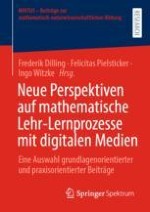2022 | OriginalPaper | Buchkapitel
Mathematische Vorstellungen handlungsorientiert und digital fördern – Konzeptionelles zum Design mathematikdidaktischer Apps
verfasst von : Daniela Götze, Anne Rahn, Julia Stark
Erschienen in: Neue Perspektiven auf mathematische Lehr-Lernprozesse mit digitalen Medien
Verlag: Springer Fachmedien Wiesbaden
Aktivieren Sie unsere intelligente Suche, um passende Fachinhalte oder Patente zu finden.
Wählen Sie Textabschnitte aus um mit Künstlicher Intelligenz passenden Patente zu finden. powered by
Markieren Sie Textabschnitte, um KI-gestützt weitere passende Inhalte zu finden. powered by
